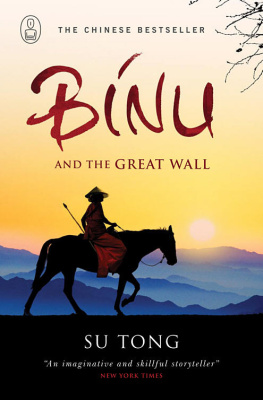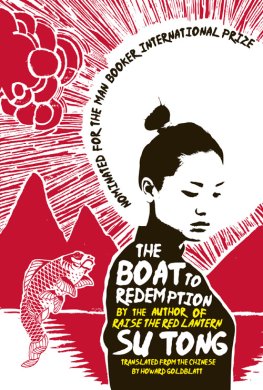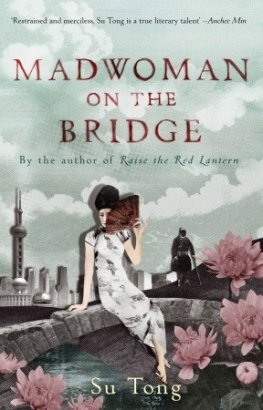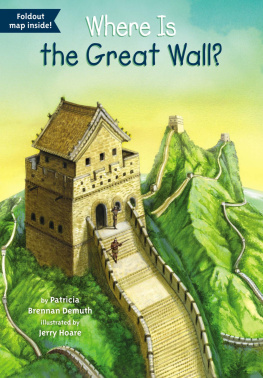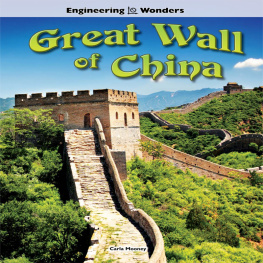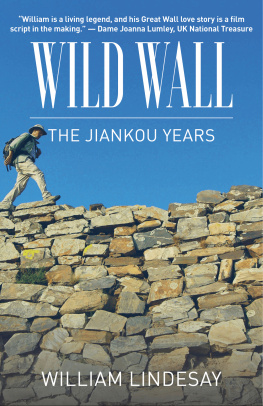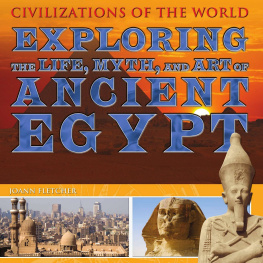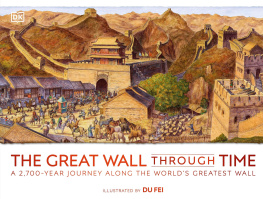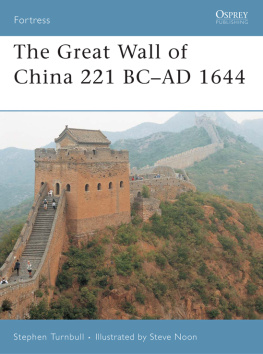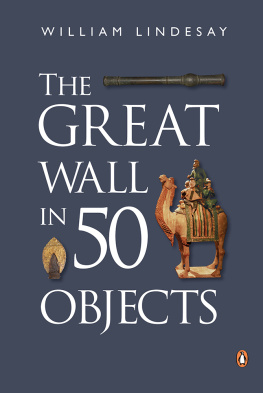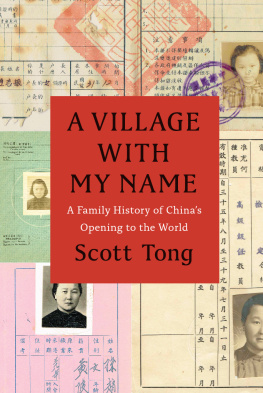Myths are universal and timeless stories that reflect and shape our lives they explore our desires, our fears, our longings, and provide narratives that remind us what it means to be human. The Myths series brings together some of the worlds finest writers, each of whom has retold a myth in a contemporary and memorable way. Authors in the series include: Chinua Achebe, Alai, Karen Armstrong, Margaret Atwood, AS Byatt, Michel Faber, David Grossman, Milton Hatoum, Natsuo Kirino, Alexander McCall Smith, Toms Eloy Martnez, Klas stergren, Victor Pelevin, Ali Smith, Donna Tartt, Su Tong, Dubravka Ugresic, Salley Vickers and Jeanette Winterson.
The tale of Binu wailing at the Great Wall has been passed down through generations for two millennia in China; a story that has been told again and again by ordinary people. Mine is only the latest retelling, but blessed with the added good fortune of finding its way beyond Chinas borders.
In one sense, myths are soaring realities; when troubling realities soar, they may remain troubling, but they afford the people experiencing those realities the opportunity to escape for a short time: a welcome escape, and a necessary one.
The most beautiful, uninhibited imagination invariably comes from ordinary people. To a large extent, I wrote this book to re-imagine the emotional lives of these people, the distillation of which, in my view, forms a sort of popular philosophy. In effect the writing process became an inquiry into this particular imagined realm.
The wild imaginings of all humanity are structured by peoples emotional landscapes; fundamental principles of freedom, equality, and justice co-exist both in our real and imagined lives. Myths instil in us a special way of thinking; what exists in the quotidian world but can also make the leap to paradigms that surpass life bestows on us an extraordinary reason to live. Where myths are created, the world offers a succinct but warm contour: life and death, entrances and exits are given natural, if emblematic, reasonings; cruel, harsh, real-life problems can be resolved.
In the mythical tale of Binu (or as she is known more formally, Meng Jiangn), a womans tears bring the Great Wall crashing down; it is an optimistic tale, not a sorrowful one. Rather than characterize it as a womans tears bringing an end to the drawn-out search for her husband, we might say that those tears enable her to resolve one of lifes great predicaments.
How one relates a tale that everyone already knows is a problem that all writers face. There is a Binu in the heart of everyone; my understanding of her comprises an exploration of gender, the recognition of a pure heart, the recollection of a long absent emotion; my understanding of her fate is a realisation of suffering and existence. Binus story is a legend not so much about a woman at the bottom of society, but rather a legend about status and social class.
I have seen the Great Wall, and I have visited the Meng Jiangn Temple. But I have never seen Binu. Who has? She is set adrift in narrative history and takes on many forms. I have attempted to give her a rope, one that can stretch across two thousand years, allowing her to pull me along with her; like Binu, I want to go to the Great Wall.
The people who live at the foot of North Mountain cannot cry, even today. Grey-haired adults seize the opportunity to instruct future generations; they point to North Mountain and recall the tragedy that occurred so many years ago.
Child, they say, other peoples ancestors lie beneath the ground, but the spirits of our ancestors roam the slopes of North Mountain. Why do you think those white butterflies flit about the mountain? And what about the scarab beetles that scurry back and forth across mountain paths? They are the spirits of our ancestors who were wronged; that is why. They are trying to find their North Mountain gravesites. Other peoples ancestors died of starvation and illness, or of old age, or in war. But our ancestors died of injustice. Guess, child, I want you to guess. Why did they die? Ah, you can guess all you want, but you will never get the right answer. Their eyes were the cause of their deaths; they drowned in their own tears!
The wild vegetation on the mountain was ideal for eating and its spring water perfect for drinking except for the water in the pool that formed when water ran down the mountain slope and into Lord Xintaos empty grave according to the Kindling Village sorceresses, who were the source of all local knowledge. No one now could recall what Lord Xintao had looked like when he lived as a hermit on North Mountain, but no one dared drink that water, for that would be tantamount to drinking from a pool of tears, the accumulated tears of three hundred ancient spirits, covered by a layer of sweet rainwater.
Lord Xintaos funeral had alarmed the king; he forbade people to cry and positioned armies of court officials and prefecture soldiers half-way up the mountain to examine mourners as they came down the mountain. Some passed through the blockade without incident, others were stopped, their cheeks and eyes subjected to intense scrutiny; three hundred villagers whose tears had yet to dry were detained half-way down the mountain. The tears they had shed at Lord Xintaos funeral were about to cost them their lives.
High officials and members of the royalty knew of the new law, but not the villagers who lived at the foot of North Mountain. Blue Cloud Prefecture and the cities of the north were far off on the other side of the mountain; news of the outside world seldom reached them. All year round, they talked only of tilling fields and planting crops. Long after it had happened, the people learned that Lord Xintao had been exiled to North Mountain by the King, his back tattooed in gold with the Kings command, condemning him to death in a frozen climate. But Lord Xintao lived on until Qingming, the day set aside for sweeping graves, when he looped a strip of white silk over a beam in his hut and hanged himself. The people living at the foot of the mountain, simple folk who held stubbornly to their beliefs, knew only that Lord Xintao was the Kings uncle; his royal blood alone made him deserving of their reverence, and added to that was respect for anyone who lived the life of a recluse. On the day of his funeral they ran down the mountain, overcome with sorrow for the departed and unaware that their tears were to be their undoing.
To this day, the villagers at the foot of North Mountain dare not shed a tear on pain of death.
The descendants of the weeping spirits were scattered throughout the Peach Village, Kindling Village and Millstone Village area, where even young children understood their ancestry. In Peach Village and Millstone Village, the right to cry was, in the main, determined by age. Once a child learned to walk, he was no longer permitted to cry. The residents of Kindling Village, on the other side of the river, imposed an outright prohibition on crying, with no exceptions, not even for newborn babies; the honour or disgrace of these opposite-bank residents was directly linked to their sons and daughters tear ducts. Village women, in an impassioned attempt to hold their heads up in the company of others, sought the ministrations of sorcerers, and most of the clever women had command of the proper magic to prevent crying: they fed their infants a concoction of mothers milk and juice of wolfberry and mulberry; when the recipients of this red liquid were fully fed, they fell into a long, peaceful sleep. There were occasional recalcitrant children whom no one seemed able to stop from crying, making the Kindling Village mothers worry endlessly. They had a secret means of relieving their vexations, so mysterious it invited all sorts of fantastic speculation. Residents of neighbouring villages would gaze across the river and wonder at the peace and quiet of Kindling Village, that and the visible decrease in its population. The primary cause of both, they concluded, was the absence of crying children. Those children who cried how could they all simply disappear?

